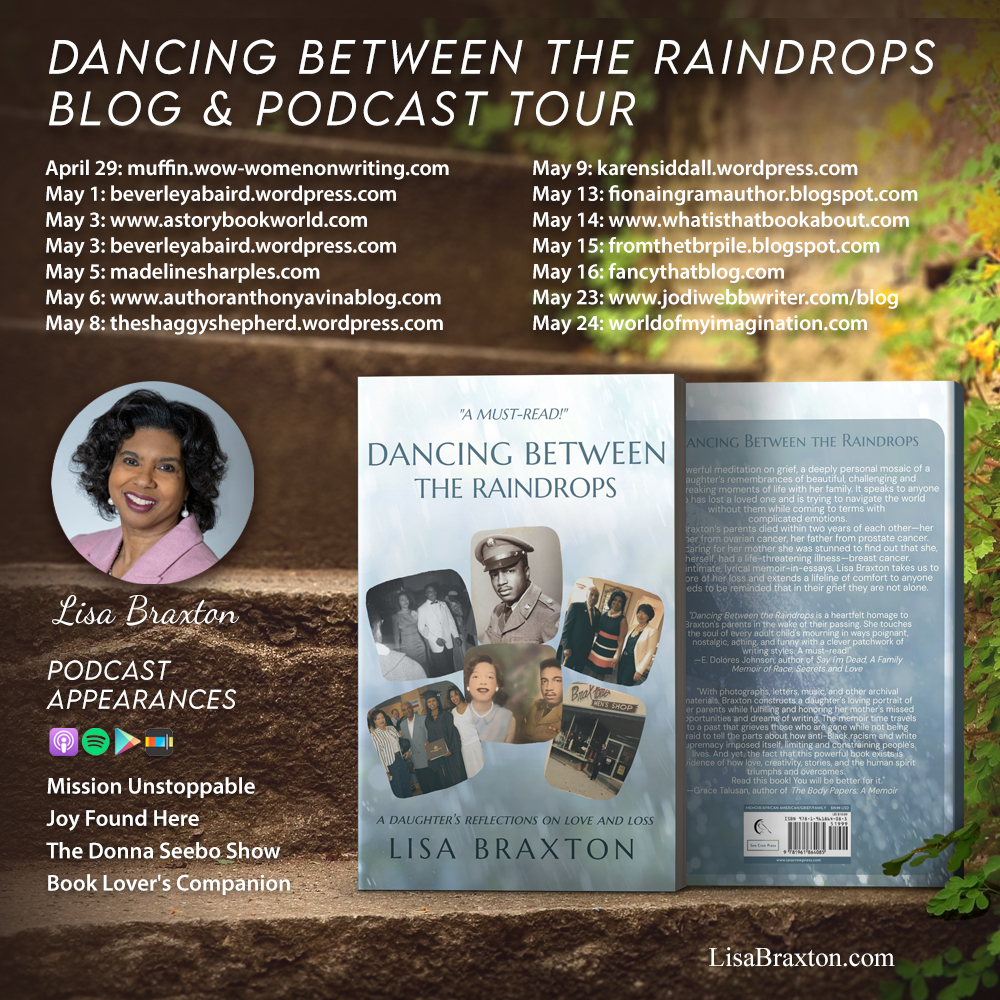Today, I’m honored to have Lisa Braxton on my blog as a guest. Her book DANCING BETWEEN THE RAINDROPS is on tour with WOW! Women on Writing. Make sure you check out her book and come on back to read her post.
I was blessed to have my parents for a long time. Mom was 83 when she passed away. Two years later, a week after we had celebrated Dad’s 90th birthday, he died. I miss my parents. I loved them deeply and think about them every day. But sometimes my grieving is crowded out by memories of the stress I endured, trying to no avail to get them to take care of their estate planning. At times it was crushing.
Mom and Dad had a traditional 1950s marriage. Mom was 18 when they married. Dad was 22. Dad had the last word on most decisions. Mom didn’t always like it, but she swallowed hard and accepted the majority of his decisions. That fragile balance seemed to work for decades.
Long before they became frail and elderly, when they were middle-aged, I encouraged them to do their estate planning. The conversation took a left turn. Dad didn’t really respond, and Mom started crying, accusing me of simply wanting their money. I felt like I was sitting on a time bomb. Eventually, I was. In his 70s, Dad started showing signs of dementia and Parkinson’s disease His personality changed. He’d get angry and have outbursts. He also ran through lots of money.
Mom and Dad operated a men’s clothing store from the late 1960s until the early 2000s and had acquired properties on that same block that they rented out to businesses and residents. Eventually the city wanted to redevelop the block and handed my parents a sizable check, which Mom and Dad
divided between themselves. Day after day, Dad was spending his half on lottery tickets and clothing
for the now nonexistent store that in his addled mind, he was going to operate from a different location. After he depleted his account, he bullied Mom for money. Sometimes she obliged.
He also withdrew a large sum against his life insurance policy for who I believe were scammers. Years of payments meant nothing to the insurance company. The premiums got so high that Dad defaulted.
Meanwhile, I was attending workshops on estate planning, to get advice from financial planners on how to convince my parents to protect their assets. The experts I talked to simply said, “You have to keep trying.”
According to AARP, my parents’ mindset was not unusual. Sooner or later, most of us will need some long-term care. But many of us don’t want to talk about that reality, much less plan for it.
Nothing worked. In the weeks before Mom passed away, when she was in home hospice and was very weak, I discovered that she still had Dad listed as a beneficiary on her bank accounts. I had visions of her depleting her accounts too. I hurried to the bank, got the proper forms and guided Mom’s hand for her to sign papers to turn what Dad hadn’t spent over to my sister and me.
After the funeral, Dad refused to move out of the house. My sister and I had to sue him to get possession of the house to pay for the care he needed in a private facility that had a memory care unit.
When he died, if he had lived two months longer we would have run out of money to pay for his care. I wear Mom’s rings and tap the diamond each day to let her know I’m thinking about her and I wear
Dad’s watch for special occasions. I believe I will always grieve.
But I can’t help thinking about the hundreds of thousands of dollars lost that my sister and I could have used to build generational wealth if only Mom and Dad had not refused to plan for the future. If they had been open to the conversation when they were young, when the thought of retirement, becoming ill or disabled seemed far in the future, my grieving wouldn’t be mixed in with so many “if onlys.”
